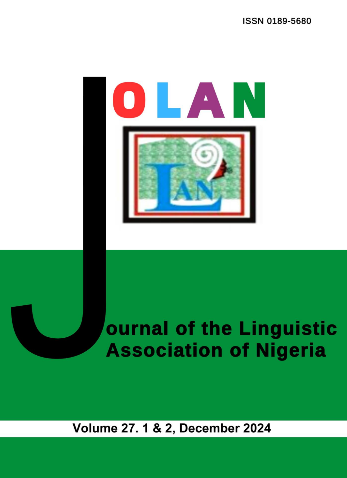A Phonological Analysis of Igbo Pet names
Keywords:
Igbo formal name, pet name, phonological analysisAbstract
Igbo names embody a rich mine of information on the people's reflection, therefore often sentential. A pet name is a name we receive in addition to our formal names and it is usually given to us by the people close to us; Pet names may be derived through the truncation of a person’s formal name; it may be an ironic pet name, profession pet name or personal feature pet name. This paper examines Igbo formal names with a view to phonologically analyse pet names which are derived from them, and does not delve into pet names which are not related to persons’ formal or proper names. The study deploys primary research method (using informants of Igbo nativity whose age ranges are from 28-80 years), secondary research method and introspection, given the language competence of the researchers, to achieve its purpose. The findings show that metathesis (an unpopular phonological process) as well as vowel deletion and assimilation are phonological processes which are evident in pet naming. It was also observed that in pet name transformations, light syllables are favoured more than heavy syllables; this conforms to the syllable structure of the language.
References
Achebe, Chinua (1982). Morning yet on creation day. London: Heinemann.
Anyachonkeya, Ngozi (2006). Omuma heritage: A linguistic approach to the historical, anthropological and sociological investigation of a people. Owerri: Chukwuemeka Printers and Publishers.
Anyachonkeya, Ngozi (2014). “Naming in Igbo land: A linguistic and cultural study”. Mediterranean Journal of Social Sciences. Rome-Italy: MCSER Publishing Vol 5 No 17. ISSN 2039-2117 (online).
Bechar-Israeli, Haya (1995). From 'Bonehead' to 'cLoNehEAd': Nicknames, Play and Identity on Internet Relay Chat. Journal of Computer-Mediated Communication 1.
Essien, Okon (2004). “Naming in Nigeria: An exploration of enterprise among some ethnic groups”
In Language and culture in Nigeria: A festschrift for Okon Essien. Ndimele, Ozo-mekuri. (ed). Port Harcourt: National Institute for Nigerian Languages and Emhai Printing and Publishing Company.
Filani, Ibukun and Melefa, Omotosho Moses (2014) A socio-semiotic study of nicknaming among undergraduates in a Nigerian University. Linguistik online http://dx.doi.org/10.13092/lo.68.1632
Heine, Bernd and Nurse, Derek (2000). African languages: An introduction. Cambridge: CUP
Kenstowicz, Michael (1994). Phonology in generative grammar. Cambridge, Mass: Blackwell.
McDowell, John Henry. (1981). “Towards a Semiotics of nicknaming: the Kamasá Example”. Journal of American Folklore.
Odisho, Edward (1997). “A comparative study of pet names in English and Assyrian”. In Asma Afsaruddin and A. H. Mathias Zahniser (eds). Humanism, Culture, and Language in the Near East: Studies in Honour of Georg Krotkoff. Winona Lake, Indiana: Eisenbrauns.
Richards, Jack and Schmidt, Richard (2002). Longman dictionary of language teaching and applied
linguistics. (3rd edn). London: Pearson Education Ltd
Susannah, Smith (2003). An account of the morpho-phonology of English personal initialled nicknames: orthography enters the constraint hierarchy. Bryn Mawr College Senior thesis Linguistics.
Urua, Enoabasi E. (2007). Ibibio phonetics & phonology. (2nd ed). Port Harcourt: M & J Grand Orbit Communications Ltd and Emhai Press.














